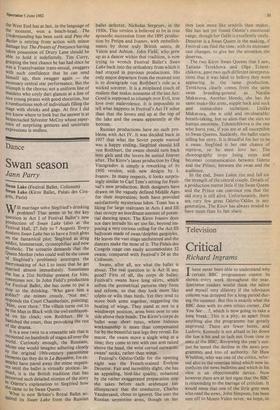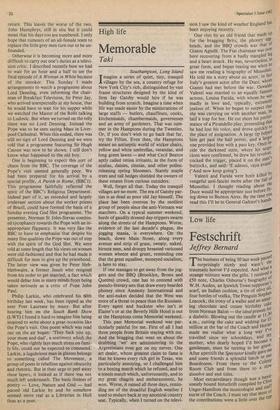Television
Critical
Richard Ingrams
T have never been able to understand why 1 certain BBC programmes cannot be shown every week throughout the year. Spectator readers would think the editor and myself very dilatory if the television column was dropped for a long period dur- ing the summer. But this is exactly what the BBC does with its own critics corner, Did You See . . ?, which is now going to take a long break. This is a pity, as apart from anything else the programme has greatly improved. There are fewer bores, and Ludovic Kennedy is not afraid to lay down the law a bit and to lash out from time to time at the BBC. Reviewing the year's out- put he noted the decline in the news pro- grammes and loss of authority. Sir Huw Wheldon, who was one of the critics, refer- red also to the venetian blind which now in- troduces the news bulletins and which in his view is an objectionable device. Now however there are at last signs that the BBC is responding to the barrage of criticism. It would seem that one of the little grey men who read the news, John Simpson, has been sent off to Monte Video never, we hope, to return. This leaves the worse of the two, John Humphrys, still in situ but it could mean that his days too are numbered. I only hope that rumours of an all-female team to replace the little grey men turn out to be un- founded.
Otherwise it is becoming more and more difficult to carry out one's duties as a televi- sion critic. I described recently how we had to wait for an hour and a half to see the final episode of A Woman in White because of the snooker. This Sunday I made arrangements to watch a programme about Lord Denning, even informing the chair- man of Breakfast Television, Sir Peter Jay, who arrived unexpectedly at my house, that he would have to wait for his supper while we watched the Master of the Rolls talking to Ludovic. But when we turned on the telly there was no Lord Denning. Instead the Pope was to be seen saying Mass in Liver- pool Cathedral. When this ended, there was still no sign of Lord Denning and we were told that a programme featuring Sir Hugh Casson was now to be shown. I still don't know what happened to the old boy.
One is beginning to expect this sort of chaos from the BBC. The coverage of the Pope's visit seemed generally poor. We had been prepared for his arrival by a special profile, A Parish in Rome, (BBCI). This programme faithfully reflected the spirit of the BBC's Religious Department. Indeed part of it, an extended and largely irrelevant section about the worker priests of Brazil, could have formed the basis of a Sunday evening God Slot programme. The presenter, Norman St John-Stevas combin- ed sycophancy towards the Pope with an in- appropriate flippancy. It was very like the BBC to have to emphasise that despite his many fine qualities the Pope was out of step with the spirit of the God Slot. We were told at some length that his views on women were old-fashioned and that he had made it difficult for men to give up the priesthood. The latter view was given by Peter Heb- blethwaite, a former Jesuit who resigned from his order to get married, a fact which would debar him in many minds from being taken seriously as a critic of Pope John Paul.
Philip Larkin, who celebrated his 60th birthday last week, has been tipped as the next Poet Laureate by many. But after hearing him on the South Bank Show (LWT) I found it hard to imagine him being inspired to write about a great occasion like the Pope's visit. One poem which was read out on the air began: `They fuck you up, your mum and dad', a sentiment which the Pope, who rightly lays much stress on fami- ly life, could not be expected to commend. Larkin, a lugubrious man in glasses belongs to something called The Movement, a group of poets in rebellion against obscurity and rhetoric. But in their urge to peel away these layers, it looked as if there was not much left underneath. The basic themes of poetry — Love, Nature and God — had passed old Larkin by and he somehow seemed more real as a Librarian in Hull than as a poet.







































 Previous page
Previous page